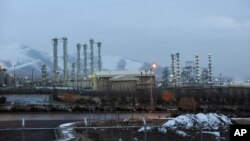The U.S. House of Representatives has approved bipartisan legislation to block the flow of illegal funds to Iran-backed Hezbollah militants, and also to sanction Hezbollah for using civilians as human shields.
The measures were approved by voice vote Wednesday and are a blow to the group, designated a terrorist organization, that lawmakers say has close ties to the government of Iran.
The bill that targets Hezbollah funding places sanctions on people and businesses engaged in fundraising and recruitment for the group.
On Thursday, in a further lash at Iran, the House is expected to vote on placing sanctions on Tehran’s ballistic missile program.
Missiles, missile technology
Thursday’s vote concerns the Iran Ballistic Missiles and International Sanctions Enforcement Act, which place sanctions on Iran if it tries to “manufacture, acquire, possess, develop, transport, transfer or use ballistic missiles or ballistic missile launch technology.”
The move has bipartisan support from the chair and ranking member on the House Foreign Affairs Committee.
House Majority Leader Kevin McCarthy has criticized the Iran deal as “a piece of paper signed in a fancy ceremony.”
Under former President Barack Obama, the United States committed to the nuclear accord as an executive agreement that can be revoked, not as a formal treaty binding future administrations.
For many Republicans, pulling out would be an appropriate use of President Donald Trump’s authority. According to many Democrats, it would be a dangerous mistake.
Earlier Wednesday, a former United States ambassador to the United Nations chided lawmakers Wednesday for engaging in a “little bit of a fake debate” surrounding Trump’s decision not to certify Iran’s compliance with the international nuclear accord.
Time to 'deal with Iran's behavior'
During testimony before the House Foreign Affairs Committee, Mark Wallace, former ambassador to the U.N who now heads the activist group United Against Nuclear Iran, said the decision by the Trump administration will now allow the U.S. government to deal with issues left out of the agreement.
“The sky didn’t fall with certification or not certification,” Wallace told lawmakers. “Now we have to deal with Iran’s behavior, as Iran and our government did not want to include a variety of issues in its negotiations in the [Joint Comprehensive Plan of Action], it carved out everything from missiles to terrorism to human rights, let’s now readdress those.”
He said it is important to respect the deal already in place, but the decertification will give U.S. diplomats the ability to exert increased leverage over Iran, including the implementation of economic sanctions.
“We have to push Iran, and we have to use our economic pressure to do that, and it’s worked in the past, it can work again, but it requires a bipartisan consensus, and this committee has always been able to do that,” Wallace said.
Merits, pitfalls
Debate is intensifying in Washington on the merits and potential pitfalls of a possible U.S. exit from the international nuclear accord with Iran. Support for the deal on Capitol Hill is largely split down partisan lines, with Republicans calling for a withdrawal from the deal and Democrats warning of the international fallout such a move might cause.
Republican Senator Lindsey Graham earlier this week echoed past comments from Trump, calling the agreement “one of the worst deals I have ever seen” and calling for it to either be changed or torn up.
Democratic Senator Tim Kaine, who lost to Trump as a vice presidential candidate in the 2016 election, said pulling out of the deal would “weaken diplomacy” and “raise the risk of unnecessary war.”
“We have given the power to the president to impose more sanctions on Iran for bellicose behavior, for activities in other countries, for violations of human rights, for violating U.N. Security Council resolutions on their missile program,” Kaine said. “The president should use the sanctions power we just gave him.”
Philip Gordon, a former White House director for the Middle East, North Africa and the Gulf Region during the Obama administration, told the congressional panel Wednesday any move to reimpose sanctions on Iran “would almost certainly lead to the collapse of the deal.”
“It’s hard to see how Iran would ever agree to give up now what it would not give up when the international pressure campaign was at its peak,” he said.
VOA House Correspondent Katherine Gypson contributed to this report.





